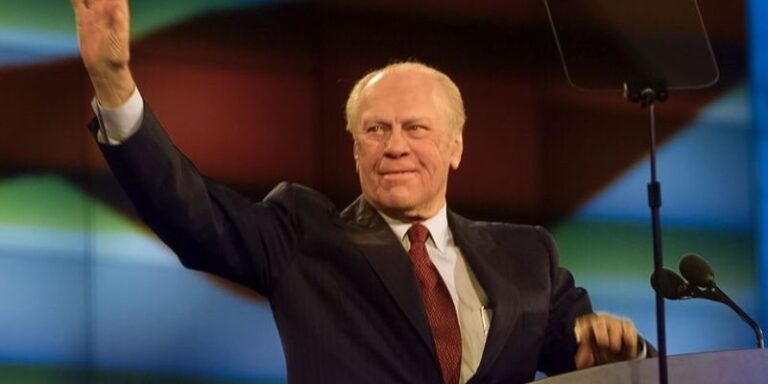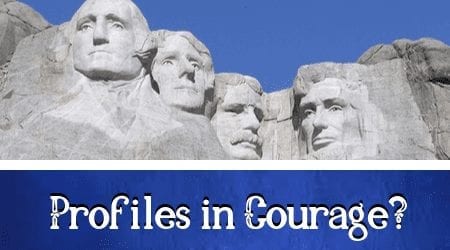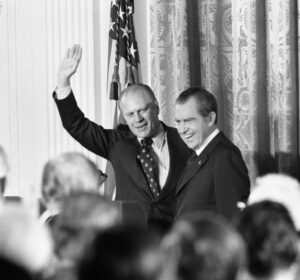Gerald Ford – America’s First Unelected President
Chosen under the terms of the 25th Amendment, Ford’s presidency was a challenge.
By: Kelli Ballard | February 7, 2023 | 647 Words

Gerald Ford (Photo by Getty Images/Bob Riha, Jr.)
Gerald Ford, the 38th US president, was born in Omaha, Nebraska, on July 14, 1913. He was born Leslie Lynch King Jr, but his mother changed his name after divorcing his father and marrying Gerald R. Ford. Though four other vice presidents had replaced presidents before him, Ford was often called the first unelected president because the people didn’t vote him into either office. Richard Nixon appointed him VP after Spiro T. Agnew resigned from the position. Then, he rose to the presidency after Richard Nixon resigned amid the Watergate scandal.
Gerald Ford and His Sudden Presidential Assignment
Before getting into politics, Gerald Ford was an athlete, studied law, and served in the Navy. In 1948, he was elected to the House of Representatives, where he continued to work for the next 25 years. He served on the Warren Commission, which investigated President John F. Kennedy’s assassination.
 Gerald Ford thought of himself as “a moderate in domestic affairs, a conservative in fiscal affairs, and a dyed-in-the-wool internationalist in foreign affairs.” These ideals were going to be greatly challenged when he eventually took over the presidency.
Gerald Ford thought of himself as “a moderate in domestic affairs, a conservative in fiscal affairs, and a dyed-in-the-wool internationalist in foreign affairs.” These ideals were going to be greatly challenged when he eventually took over the presidency.
As the Watergate scandal started hitting the headlines, Vice President Spiro T. Agnew resigned in October 1973. Although not a part of Watergate, the VP was accused of evading taxes and accepting bribes. President Nixon then appointed Gerald Ford as his new vice president, partially because of his popularity with the public. Mr. Ford took the office on December 6, 1973. But, just a few months later, on August 9, 1974, Nixon decided to resign (the only president to ever do so) instead of facing impeachment, catapulting Ford to America’s new leader.
This was a time when people’s trust in the government had been abused, and Ford had to try to find a way to heal the nation. In his inaugural address, the new commander-in-chief said, “Our long national nightmare is over. Our Constitution works. Our great republic is a government of laws and not men.” However, when he pardoned Nixon so the ex-leader would never have to face criminal charges, a lot of people were unhappy. Some suggest this is why Gerald Ford did not win his next official bid for president.
During the short two years of his presidency, Ford faced economic woes and a fear of recession. It didn’t help that he had to work with a Congress controlled by Democrats as a Republican president. His first goal was to find a solution for the inflation problems, which led him to use the power of presidential veto to prevent a lot of bills passed by Congress from becoming law.

Gerald Ford (left) and Richard Nixon (right) (Photo by Bettmann Archive/Getty Images)
Ford wanted businesses to operate with more freedom, and he reduced some of the taxes and controls that regulatory agencies had over them. “We … declared our independence 200 years ago, and we are not about to lose it now to paper shufflers and computers,” he said.
Gerald Ford ran for president in 1976 but lost to Democrat Jimmy Carter. During Carter’s inauguration speech, the new leader said, “For myself and for our Nation, I want to thank my predecessor for all he has done to heal our land.”
Ford retired from politics but continued to give speeches and stay involved by serving on boards and hobbies. He and his wife opened the Betty Ford Clinic in California to help provide treatment and research for alcohol addiction, which, at that time, was not considered a disease. In 1999, he received the Presidential Medal of Freedom, which is the highest civilian honor in America “awarded to individuals who make an especially meritorious contribution to the security or national interests of the United States, world peace, cultural or other significant public or private endeavors.”
Ford passed away on December 26, 2006, at the age of 93.
















